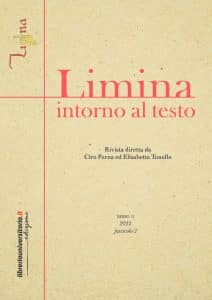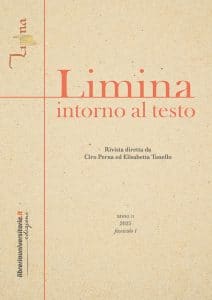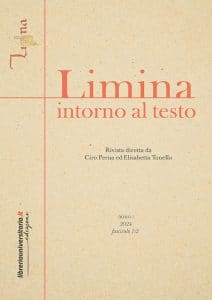
Limina. Intorno al testo
Limina è il nome di questa rivista e del progetto che vi sta alla base, un progetto che sta sempre più prendendo forma, una forma composita, reticolare, come il concetto cui essa rimanda. Il margine, l’interstizio, come spazio fisico riempito e, metaforicamente, come luogo immateriale dove far confluire idee, proposte, incontri e confronti.
Limina segnala tutto ciò che sta intorno al testo e fra le righe del testo e che può fungere da imprevisto viatico per entrare nel testo. Limen è la soglia, l’ingresso, l’accesso: varcarlo, immergendosi nel pieno delle note, delle glosse, dei segni di attenzione, delle immagini, significa avvicinare la pagina seguendo un percorso laterale, significa appropriarsi di un’opera mediante la parola altrui, coglierla in una dimensione quotidiana, nella sua ricezione minuta, nella sua capacità di penetrazione sociale oltre che culturale, illuminando il processo di costruzione e restituzione di senso che è l’essenza stessa della lettura.
Circolazione, diffusione, fortuna, ricezione. Sono i termini che descrivono il processo di deposito dell’opera presso il pubblico e di ri-attivazione dei suoi messaggi da parte dei lettori. I limina ci aiutano a studiare il testo da una prospettiva nuova, che è poi l’unica, a nostro parere, davvero viva e vitale.
Rivista pubblicata con fondi CHANGES-Cultural Heritage Active Innovation for Sustainable Society 2024, Mission 4 Component 2 Investment 1.3_Progetto: MaTELDa (Manuscript Tradition of Exegesis and Lectures on Dante) e PRIN COFIN 2022_Progetto: LiMINA (Lost in Manuscripts. Ideas, Notes, Acknowledgments).
Editorial / Informazioni editoriali
Direttori / Journal Managers
Ciro Perna (Università della Campania “Luigi Vanvitelli”)
Elisabetta Tonello (Università di Salerno)
Comitato editoriale / Editorial board
Giancarlo Alfano (Università “Federico II” di Napoli)
Zygmunt G. Barański (University of Notre Dame)
Dario Brancato (Concordia University)
Marina Buzzoni (Università di Venezia)
Rosario Coluccia (Accademia della Crusca)
Claudia Corfiati (Università di Bari)
Massimiliano Corrado (Università “Federico II” di Napoli)
Alessio Decaria (Università di Genova)
Federico Della Corte (Università eCampus)
Nathalie Ferrand (ITEM – CNRS Paris)
Maurizio Fiorilla (Università Roma Tre)
Giovanna Frosini (Università per Stranieri di Siena)
Daniela Gionta (Università di Messina)
Rosa Giulio (Università di Salerno)
Cinthia Maria Hamlin (Universidad de Buenos Aires)
Bernhard Huss (Freie Universität Berlin)
Paola Italia (Università di Bologna)
Kosuke Kunishi (Ritsumeikan University)
Rita Librandi (Università di Napoli “L’Orientale”)
Silvia Maddalo (Università della Tuscia)
Alessandra Perriccioli Saggese (Università della Campania “Luigi Vanvitelli”)
Giulia Perucchi (Università di Chieti Pescara)
Chiara Ponchia (Università di Padova)
Fabio Romanini (Università di Ferrara)
Arielle Saiber (Johns Hopkins University)
Federica Sgarbi (Doshisha University)
Franco Tomasi (Università di Padova)
Juan Varela-Portas de Orduña (Universidad Complutense de Madrid)
Paola Vecchi Galli (Università di Bologna)
Zeno Verlato (CNR Firenze)
Mirko Volpi (Università di Pavia)
Comitato di redazione / Publishing copy-editors
Giuseppe Alvino (copy editing), Angelo Raffaele Caliendo (copy editing), Federica Cifariello (copy editing), Francesco Donato (copy editing), Federica Maria
Giallombardo (copy editing), Serena Malatesta (editor in capo), Matteo Maselli (copy editing), Riccardo Montalto (copy editing), Beatrice Mosca (capo redattrice), Aldo Stabile (copy editing), Raffaele Vitolo (copy editing)
Direttore responsabile / Legal representative
Mario Lion Stoppato
Limina is a semestral Peer-Reviewed Journal
Limina è una rivista semestrale sottoposta a peer-review
Proposte / Submission
Eventuali proposte di pubblicazione vanno inviate via e-mail a redazione@libreriauniversitaria.it.
Any proposals for publication must be sent by e-mail to redazione@libreriauniversitaria.it
Codice etico / Publication ethics and malpractice statement
Limina is a peer reviewed semestral journal committed to upholding the highest standards of publication ethics. In order to provide readers with articles of highest quality we state the following principles of Publication Ethics and Malpractice Statement.
Authors are obliged to participate in peer review process and ensure that they have written original articles. In addition they ensure that the manuscript has not been issued elsewhere. All authors have significantly contributed to the research. Authors are also responsible for language editing of the submitted article. Authors confirm that the submitted works represent their authors’ contributions and have not been copied or plagiarized in whole or in part from other works without clearly citing. Any work or words of other authors, contributors, or sources (including online sites) are appropriately credited and referenced. All authors disclose financial or other conflict of interest that might influence the results or interpretation of their manuscript (financial support for the project should be disclosed). All authors are obliged to provide retractions or corrections of mistakes and agree to the license agreement before submitting the article. The publication of articles in the journal is free.
The editors ensure a fair double-blind peer-review of the submitted papers for publication. The editors strive to prevent any potential conflict of interests between the author and editorial and review personnel. The editors also ensure that all the information related to submitted manuscripts is kept as confidential before publishing.
The editors coordinates the editorial board for reviewing the works to be published in Storie e Linguaggi. The reviewers, members of the scientific committee, include experts in the field of higher education, university lecturers and researchers. Each is assigned papers to review that are consistent with their specific expertise.
Reviewers should have no conflict of interest and check all papers in a double-blind peer review process. The reviewers also check for plagiarism and research fabrication (making up research data) and falsification (manipulation of existing research data, tables, or images). In accordance with the code of conduct, the reviewers report any cases of suspected plagiarism or duplicate publishing.
Reviewers evaluate manuscripts based on content without regard to ethnic origin, gender, sexual orientation, citizenship, religious belief or political philosophy of the authors. They ensure that all the information related to submitted manuscripts is kept as confidential and must report to the editors if they are aware of copyright infringement and plagiarism on the author’s side. They must evaluate the submitted works objectively as well as present clearly their opinions on the works in a clear way in the review form. Reviewers should point out relevant published work which is not yet cited. A reviewer who feels unqualified to review the research reported in a manuscript notify the editors and excuses himself from the review process.
If an author discovers a significant error or inaccuracy in their article after it has been published, the author must notify the editorial collective and cooperate fully if an amendment or retraction is judged to be in order. In the event that an allegation of research misconduct relating to a published article is brought to the editorial board, the journal will follow the guidelines of the Committee on Publication Ethics in responding to the allegation.



